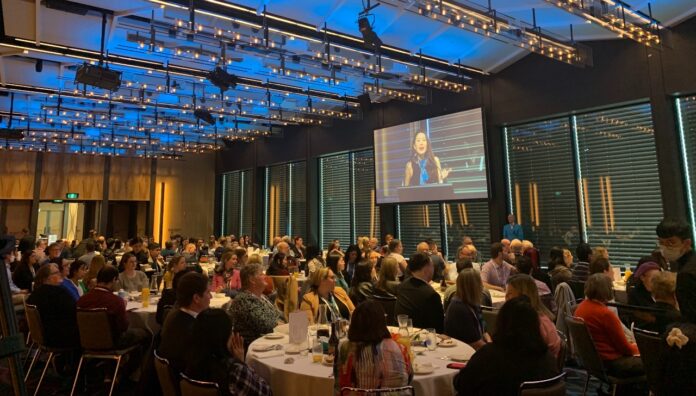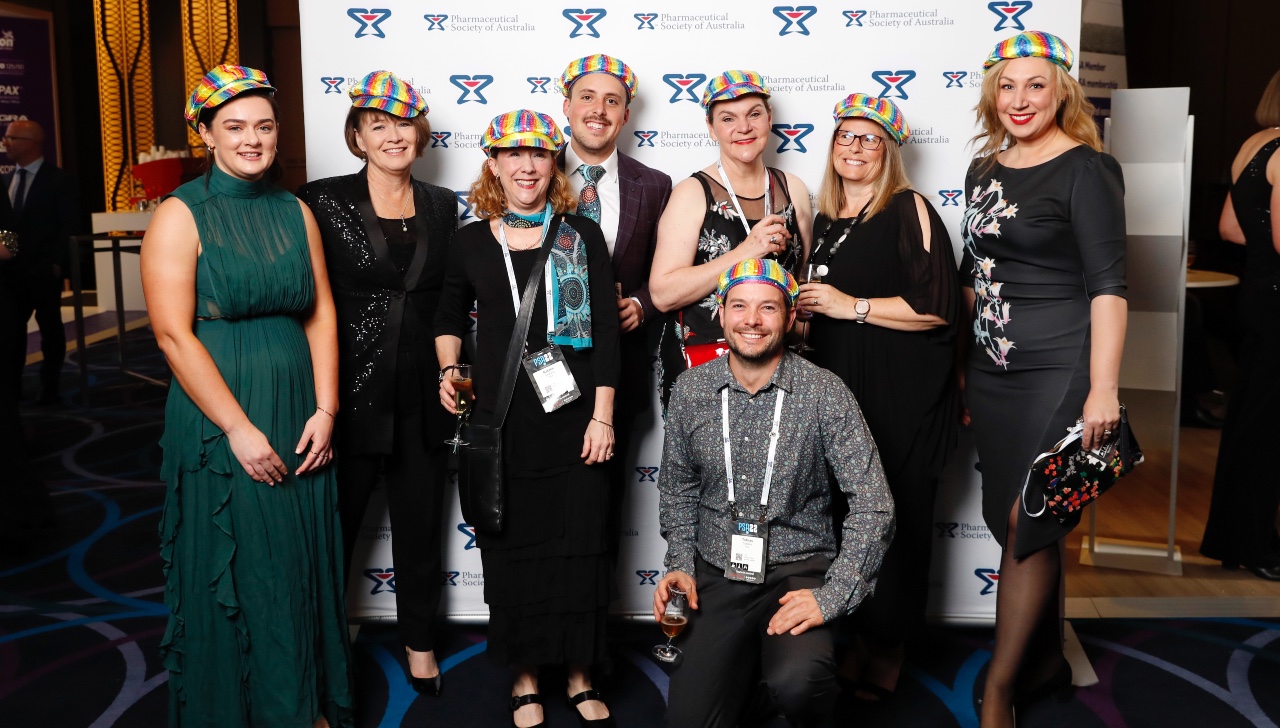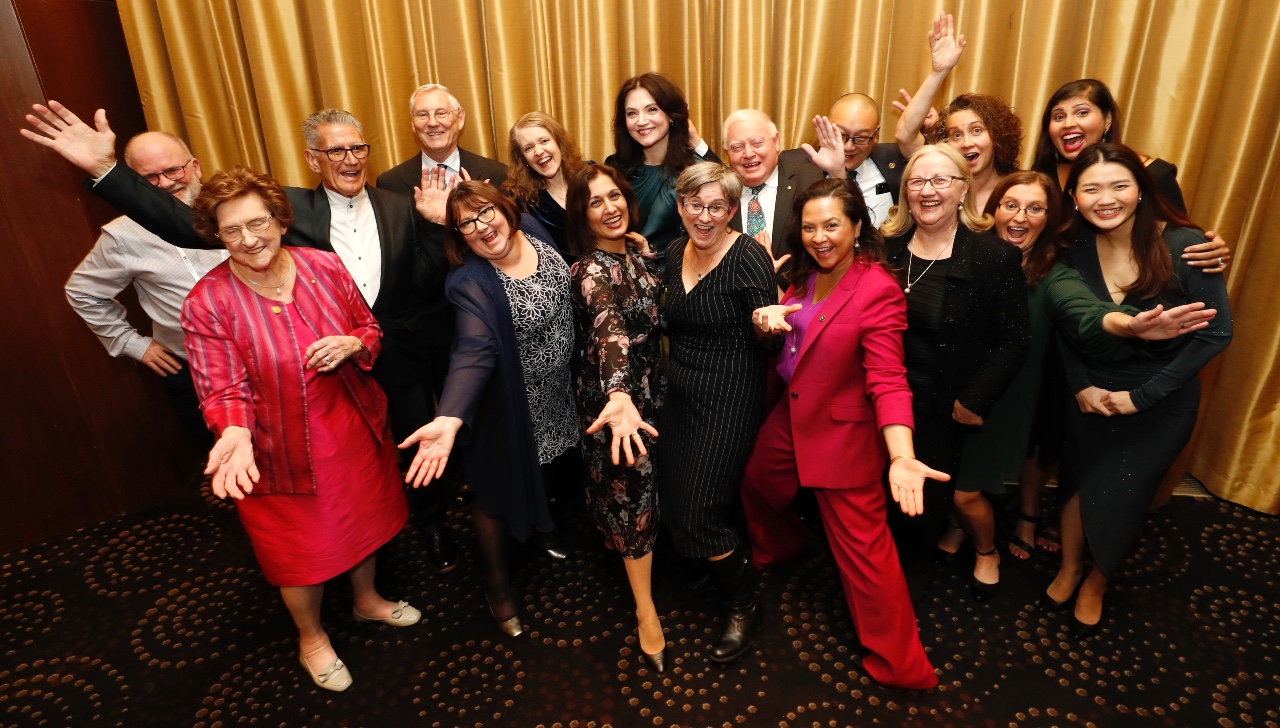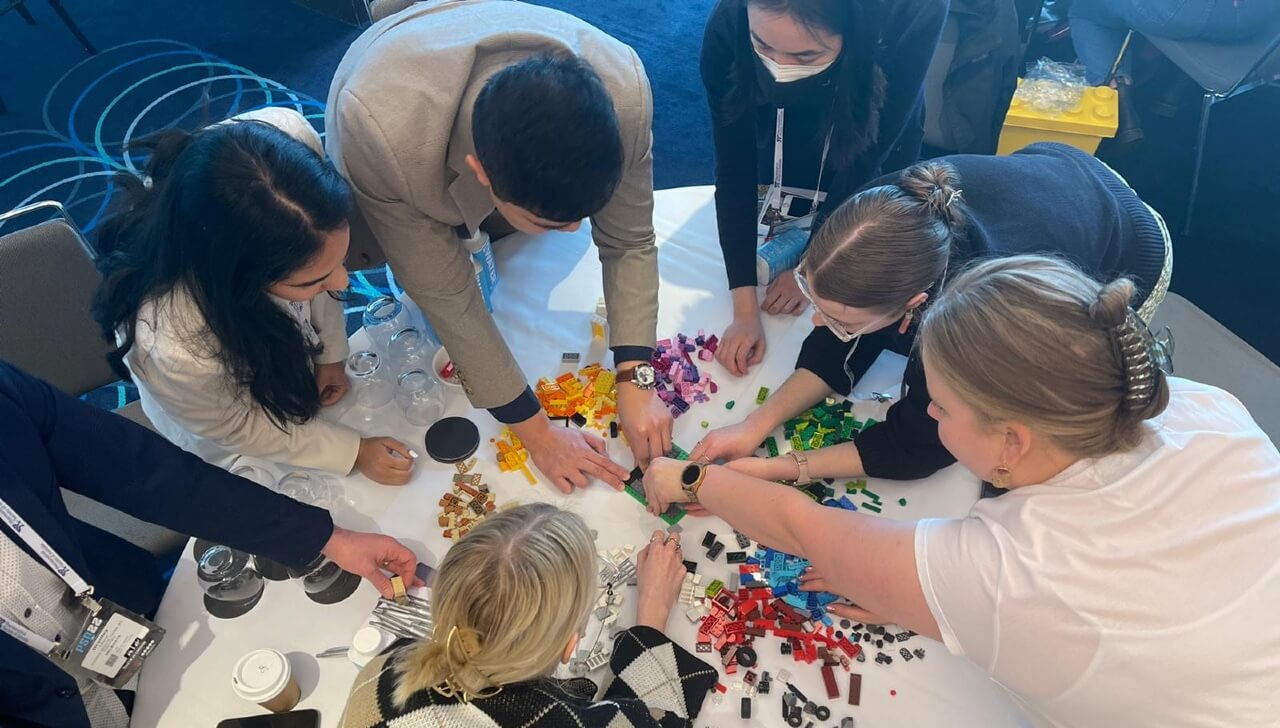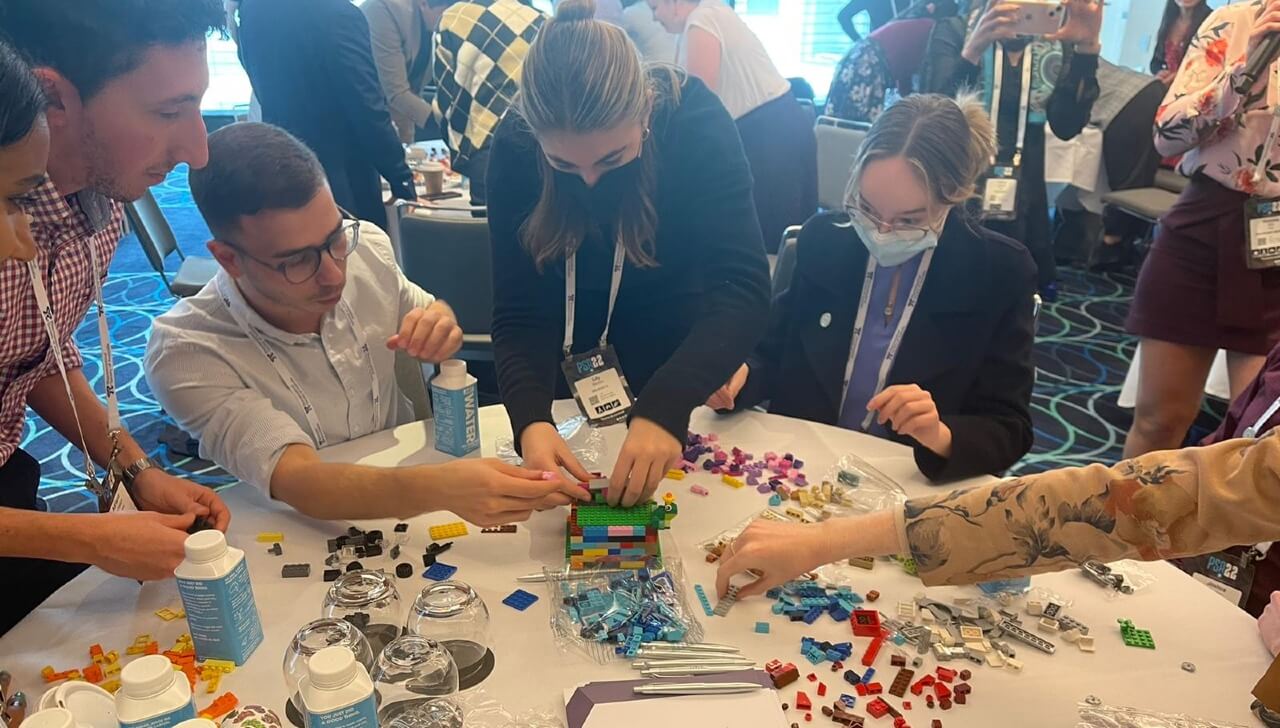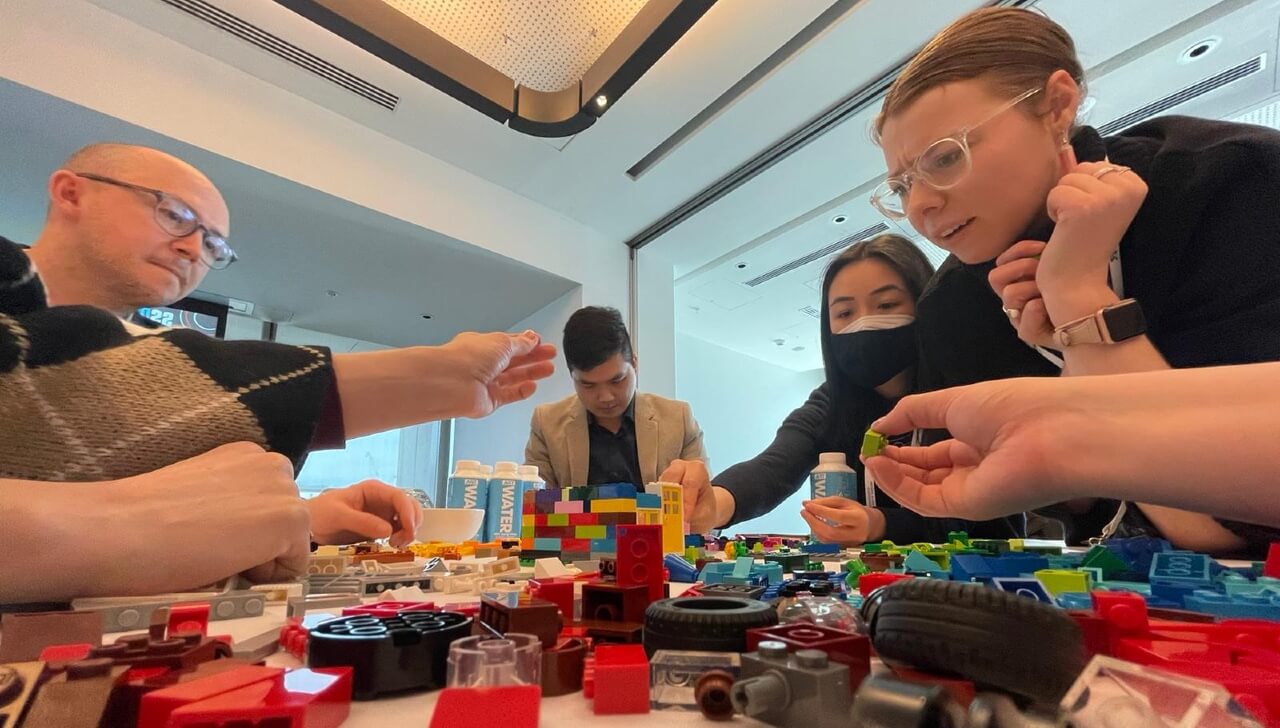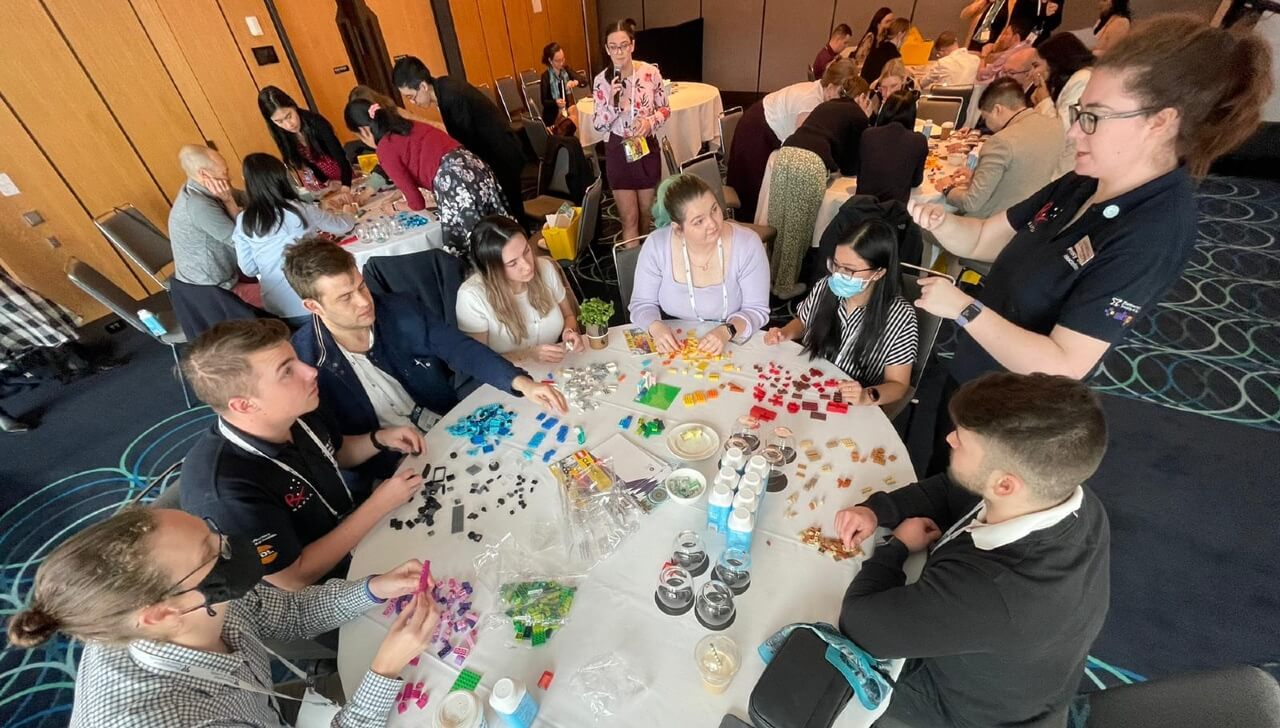At the final day of PSA’s national conference, attendees boosted their knowledge of poisons control, the latest Aboriginal and Torres Strait Islander healthcare policies and guidelines, and supporting transgender patients.
PSA22 FAST FACTS
Spot yourself in the crowd in the PSA22 highlights reel |
The night before, pharmacists danced up a storm in sequin-adorned costumes at the PSA22 Gala Dinner.
At the “Dancing with the Pharmacists” competition, pharmacists showcased their moves, wowing the judges and audience alike.
PSA National President Dr Fei Sim, pharmacy legend John Bell AM FPS and 2021 PSA MIMS Intern Pharmacist of the Year Erin Cooper MPS (who teaches ballet but has ‘never’ done ballroom dancing before), were all paired with professional dancers.
The pros were very gracious in their comments about the absolute triumph of each pharmacist in their dancing segment. The all-star PSA judging panel comprising Senior Pharmacist – Strategic Policy Peter Guthrey MPS, Public Affairs and Communications Manager Candice Burch and Events Officer Chontelle Grecian rewarded all three acts the same number of points, as the band started up and the dance floor was packed within seconds.
Dancing with (all the) Pharmacists!! #PSA22SYD pic.twitter.com/MYUvGQriWu
— PSA (@PSA_National) July 30, 2022
The morning after
Early risers turned out for the Aboriginal and Torres Strait Islander Pharmacy Practice CSI this morning, where experts Mike Stephens MPS, Megan Tremlett MPS and Hannah Loller MPS discussed emerging trends, models, policies and guidelines in Aboriginal and Torres Strait Islander health – including PSA’s Guideline for pharmacists supporting Aboriginal and Torres Strait Islander peoples with medicines management, launched on Saturday (Day 2).
‘The guidance can be used as a tool to support balanced and professional decision making, and ensure that Aboriginal and Torres Strait Islander patients’ needs, beliefs and preferences are met in a culturally safe way,’ said Dr Sim.
Delegates were given the opportunity to network and share their experiences supporting Aboriginal and Torres Strait Islander patients.
Mark Stephens discussing emerging trends in Aboriginal and Torres Strait Islander health, deadly talk!! 👏👏👏👏#psa22syd @PSA_National Recognising our PSA SA-NT manager @mellivora_ratel 🥳🥳🥳for her tremendous work in this space @Chris_Camp6ell @KACas06 pic.twitter.com/zoUye8rGnm
— Veronika Seda MPS (@they__call_me_V) July 30, 2022
Next, pharmacists got the opportunity to revisit their childhood at the The Early Career Pharmacists CSI, when they explored the commonalities between pharmacy and lego through themes of leadership, communication skills and strategic planning.
Lessons in patient care
Across at the ‘How to better support your transgender and gender diverse patients’ session, pharmacist Michael Minter and GP Dr Clara Tuck Meng Soo explained the important role pharmacists have in creating a supportive environment for patients.
Mr Minter described a formative experience when he was an intern at a small rural pharmacy which forever changed his perception of transgender and gender diverse patients, and their healthcare needs.
When a seemingly cis gender heteronormative couple presented to the pharmacy with two prescriptions under different names for estrogen medicines, he assumed there had been a mistake on the prescription of the patient with the ‘big bushy beard’.
Feeling super confident that he had picked up a doctor’s error as a budding pharmacist, he told the patient he would arrange for the mistake to be fixed.
When the patient informed Mr Minter that they were in fact transitioning, he felt ashamed but also grateful that the pharmacy was quiet at that time, and he hadn’t put the patient at risk of violence.
Now, Mr Minter is well-versed in supporting transgender patients through their transition journey.
‘There is no fixed path for gender affirmation care,’ Mr Minter said.
‘Terms change with time, so it is important to recognize, “what do you prefer to be referred as?”’ Dr Soo added.
Feminising hormonal affirmation; important slide of consideration in order to be able to talk about treatment expectations and monitoring points in supporting these patients whether they are beginning their journey or on their journey already. #PSA22SYD pic.twitter.com/S9Bq4IiGLv
— Raymond Truong (@truryAdelaide) July 30, 2022
The future of pharmacist prescribing
The landmark decision to extend the Urinary Tract Infection Pharmacy Pilot – Queensland (UTIPP-Q) was a turning point in pharmacist prescribing. In a session about the outcomes of the pilot, Professor Lisa Nissen, Head of School of Clinical Sciences at the Queensland University of Technology and UTIPP-Q lead told attendees, ‘I’m hoping [it] will not only be something that we are doing in Queensland as an ongoing opportunity, but something that will reach across the rest of the country like vaccination did.’
‘We’ve got great opportunities now to learn from some of these things that we’ve already done,’ she said. ‘Don’t reinvent the wheel, leap off the backs of all the pharmacists that have done such amazing work in vaccination.’
Tales of poisons control
Meanwhile, at the fascinating session, ‘Medication safety on the line: lessons for pharmacists from calls to Poisons Information Centre’, attendees learned what medicines are most commonly involved in patient calls to the centre – paracetamol tops the list – and how to respond in the event of a poisons enquiry.
Presenter Genevieve Adamo, Senior Specialist in Poisons Information – Toxicovigilance at the NSW Poisons Information Centre discussed common scenarios that could turn dangerous including accidental double dosing of clonidine and guanfacine, when both parents unknowingly administer the medicines to their child.
Delegates also learned some counselling points when supplying medicines to reduce the risk of accidental overdose, including discussing maximum doses of paracetamol with all patients using the medicine, along with other forms of paracetamol, such as combination products and different liquid strength.
But a big no no in terms of paracetamol for anyone who works in toxicology is the modified release form, Ms Adamo warned. It’s not necessary most of the time.
‘It’s got really awful kinetics,’ she said. ‘The absorption is really erratic, we get multiple peaks, which are completely unpredictable.’
Some excellent points – unfortunately we still see many (accidental & deliberate) paracetamol OD in the EDs #PSA22SYD #tox https://t.co/ZmYoIISqyn
— Hannah Knowles (@HMKnowles) July 31, 2022
Goodbye for now
Towards the end of the day, pharmacists met for one final sit-down lunch to recap their PSA22 experiences.
As PSA22 drew to a close, Dr Sim said the conference was a great opportunity for pharmacists to come together, face to face after 3 years.
‘Pharmacists played a significant role in the health and wellbeing of Australians, having been on the front lines of the COVID-19 response, and delivering more than 8 million COVID-19 vaccination doses to date,’ Dr Sim said at the closing plenary.
‘PSA22 has been a great opportunity for pharmacists from all around Australia to reconnect and celebrate what makes our profession great.’
As always at PSA national conferences, attendees were privy to the latest medicine safety updates, this time with the launch of the Medicine Safety: Disability Care report.
‘The Medicine Safety: Disability Care report identifies the real and significant issues Australians living with disability face. It is our duty, as healthcare professionals, to keep working to make care accessible and appropriate for everyone,’ Dr Sim said.
Attendees were also the first pharmacists to hear our new government’s plans for the profession.
Amazing to hear @drfeisim’s goals for the PSA and their commitment to pharmacists everywhere! Thank you for having us! #PSA22SYD @PSA_National @NAPSA_Rx
— Georgia Bridges (@GeorgiaBridge19) July 31, 2022
‘PSA was proud to give members the opportunity to hear directly from the Federal Minister for Health and Aged Care, Mark Butler MP, about the incoming government’s agenda, and how we can continue to support the health and well-being of Australians,’ Dr Sim said.
Officially closing the conference, Dr Sim also announced dates for PSA23. Next year’s conference will be held in Sydney, NSW from 28–30 July 2023 – make sure to save the date!
‘It is so valuable to come together, share our experiences as pharmacists from a range of settings, and learn from one another,’ she said. ‘We cannot wait to see you next year.’
Need a learning fix before the next PSA national conference? Join us at these upcoming events:
- ACT Annual Therapeutic Update, 24 September, Hotel Realm
- Queensland Annual Therapeutic Update, 14–16 October, Voco Brisbane City Centre
- 47th Offshore Refresher Conference, 6–14 June 2023 in Greece




 ‘We’re increasingly seeing incidents where alert fatigue has been identified as a contributing factor. It’s not that there wasn’t an alert in place, but that it was lost among the other alerts the clinician saw,’ Prof Baysari says.
‘We’re increasingly seeing incidents where alert fatigue has been identified as a contributing factor. It’s not that there wasn’t an alert in place, but that it was lost among the other alerts the clinician saw,’ Prof Baysari says.
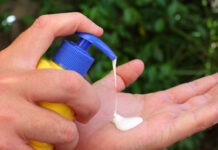

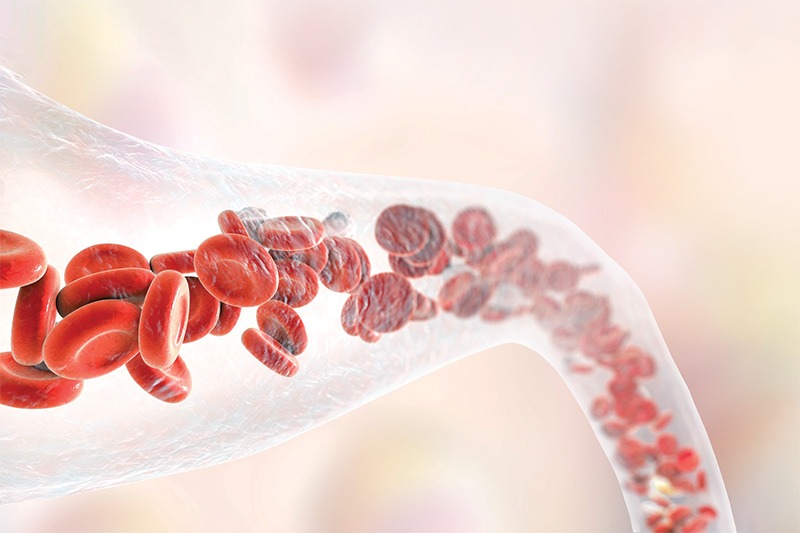 Beyond the arrhythmia, AF often signals broader pathological processes that impair cardiac function and reduce quality of life and life expectancy.5 Many of these conditions are closely linked to social determinants of health, disproportionately affecting populations with socioeconomic disadvantage. Effective AF management requires addressing both the arrhythmia and its underlying contributors.4
Beyond the arrhythmia, AF often signals broader pathological processes that impair cardiac function and reduce quality of life and life expectancy.5 Many of these conditions are closely linked to social determinants of health, disproportionately affecting populations with socioeconomic disadvantage. Effective AF management requires addressing both the arrhythmia and its underlying contributors.4  C – Comorbidity and risk factor management
C – Comorbidity and risk factor management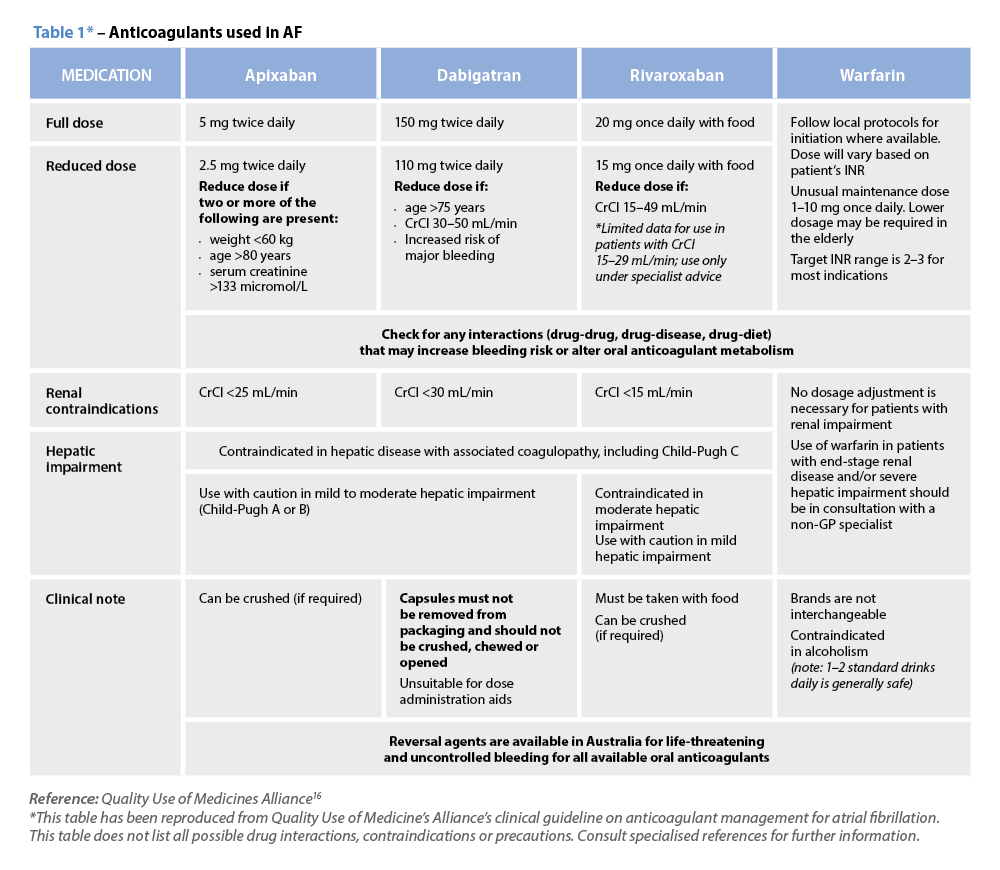 Warfarin
Warfarin